
Volume XIII, Issue III
Phantasies
By George Macdonald, Chapter 25
Our life is no dream; but it ought to become one, and perhaps will."
~ Novalis
And on the ground, which is my modres gate,
I knocke with my staf; erlich and late,
And say to hire, Leve mother, let me in."
~ Geoffrey Chaucer, "The Pardoneres Tale".
Sinking from such a state of ideal bliss, into the world of shadows which again closed around and infolded me, my first dread was, not unnaturally, that my own shadow had found me again, and that my torture had commenced anew. It was a sad revulsion of feeling. This, indeed, seemed to correspond to what we think death is, before we die. Yet I felt within me a power of calm endurance to which I had hitherto been a stranger. For, in truth, that I should be able if only to think such things as I had been thinking, was an unspeakable delight. An hour of such peace made the turmoil of a lifetime worth striving through.
I found myself lying in the open air, in the early morning, before sunrise. Over me rose the summer heaven, expectant of the sun. The clouds already saw him, coming from afar; and soon every dewdrop would rejoice in his individual presence within it.
I lay motionless for a few minutes; and then slowly rose and looked about me. I was on the summit of a little hill; a valley lay beneath, and a range of mountains closed up the view upon that side. But, to my horror, across the valley, and up the height of the opposing mountains, stretched, from my very feet, a hugely expanding shade. There it lay, long and large, dark and mighty. I turned away with a sick despair; when lo! I beheld the sun just lifting his head above the eastern hill, and the shadow that fell from me, lay only where his beams fell not. I danced for joy. It was only the natural shadow, that goes with every man who walks in the sun. As he arose, higher and higher, the shadow-head sank down the side of the opposite hill, and crept in across the valley towards my feet.
Now that I was so joyously delivered from this fear, I saw and recognised the country around me. In the valley below, lay my own castle, and the haunts of my childhood were all about me hastened home. My sisters received me with unspeakable joy; but I suppose they observed some change in me, for a kind of respect, with a slight touch of awe in it, mingled with their joy, and made me ashamed. They had been in great distress about me. On the morning of my disappearance, they had found the floor of my room flooded; and, all that day, a wondrous and nearly impervious mist had hung about the castle and grounds. I had been gone, they told me, twenty-one days. To me it seemed twenty-one years. Nor could I yet feel quite secure in my new experiences. When, at night, I lay down once more in my own bed, I did not feel at all sure that when I awoke, I should not find myself in some mysterious region of Fairy Land. My dreams were incessant and perturbed; but when I did awake, I saw clearly that I was in my own home.
My mind soon grew calm; and I began the duties of my new position, somewhat instructed, I hoped, by the adventures that had befallen me in Fairy Land. Could I translate the experience of my travels there, into common life? This was the question. Or must I live it all over again, and learn it all over again, in the other forms that belong to the world of men, whose experience yet runs parallel to that of Fairy Land? These questions I cannot answer yet. But I fear.
Even yet, I find myself looking round sometimes with anxiety, to see whether my shadow falls right away from the sun or no. I have never yet discovered any inclination to either side. And if I am not unfrequently sad, I yet cast no more of a shade on the earth, than most men who have lived in it as long as I. I have a strange feeling sometimes, that I am a ghost, sent into the world to minister to my fellow men, or, rather, to repair the wrongs I have already done.
May the world be brighter for me, at least in those portions of it, where my darkness falls not.
Thus I, who set out to find my Ideal, came back rejoicing that I had lost my Shadow.
When the thought of the blessedness I experienced, after my death in Fairy Land, is too high for me to lay hold upon it and hope in it, I often think of the wise woman in the cottage, and of her solemn assurance that she knew something too good to be told. When I am oppressed by any sorrow or real perplexity, I often feel as if I had only left her cottage for a time, and would soon return out of the vision, into it again. Sometimes, on such occasions, I find myself, unconsciously almost, looking about for the mystic mark of red, with the vague hope of entering her door, and being comforted by her wise tenderness. I then console myself by saying: "I have come through the door of Dismay; and the way back from the world into which that has led me, is through my tomb. Upon that the red sign lies, and I shall find it one day, and be glad."
I will end my story with the relation of an incident which befell me a few days ago. I had been with my reapers, and, when they ceased their work at noon, I had lain down under the shadow of a great, ancient beech-tree, that stood on the edge of the field. As I lay, with my eyes closed, I began to listen to the sound of the leaves overhead. At first, they made sweet inarticulate music alone; but, by-and-by, the sound seemed to begin to take shape, and to be gradually moulding itself into words; till, at last, I seemed able to distinguish these, half-dissolved in a little ocean of circumfluent tones: "A great good is coming--is coming--is coming to thee, Anodos"; and so over and over again. I fancied that the sound reminded me of the voice of the ancient woman, in the cottage that was four-square. I opened my eyes, and, for a moment, almost believed that I saw her face, with its many wrinkles and its young eyes, looking at me from between two hoary branches of the beech overhead. But when I looked more keenly, I saw only twigs and leaves, and the infinite sky, in tiny spots, gazing through between. Yet I know that good is coming to me--that good is always coming; though few have at all times the simplicity and the courage to believe it. What we call evil, is the only and best shape, which, for the person and his condition at the time, could be assumed by the best good. And so, farewell.
The End

Thomas Jefferson said of Falling Spring Falls in the Alleghany Highlands of Virginia:“The only remarkable cascade in this country is that of the Falling Spring in Augusta…it falls over a rock 200 feet into the valley below.” -- Thomas Jefferson, ‘Notes on the State of Virginia’ written in 1781. The falls are actually 80 feet high.
Regional Travel Map
A Different Trip Planning Resource

Regional Travel Map by Bob Kirchman.
Sometimes it is nice to have a good old flat paper map in front of you when you are planning a regional road trip. GPS and electronic maps are great, but they sometimes fail to give you the 'overview' you had with a good old-fashioned map. As you plan your Summer travels, you can download the Journey Regional Map [click to read], print it, and plan a few road trips.
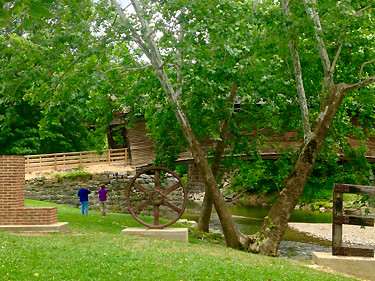
Find LOVE at Alleghany County Virginia's 160 year-old Humpback Bridge.[1.]
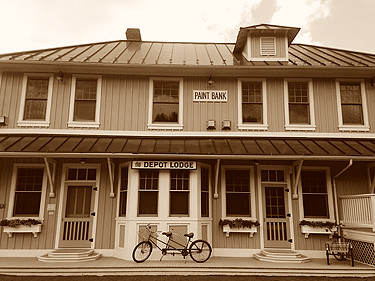
Paint Bank, in Craig County, Virginia got its unusual name from the iron ochre and red clay taken from the banks of Potts Creek that was used by Native Americans, notably the Cherokees, as war paint, and to make their pottery with a distinctive red color. Photo by Bob Kirchman

The General Store in Paint Bank, Virginia. The Swinging Bridge Restaurant is located in an extension of this building and features delicious buffalo dishes. Photo by Bob Kirchman
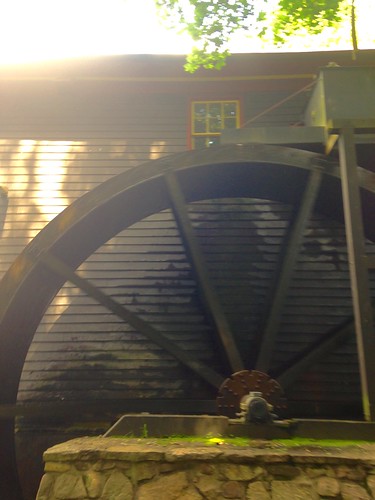
Tingler's Mill in Paint Branch, Virginia. Photo by Bob Kirchman
Why Beauty Matters
Finally, brethren, whatsoever things are true, whatsoever things are honest, whatsoever things are just, whatsoever things are pure, whatsoever things are lovely, whatsoever things are of good report; if there be any virtue, and if there be any praise, think on these things." -- Phillipians 4:8
Let thy work appear unto thy servants, and thy glory unto their children. And let the beauty of the Lord our God be upon us: and establish thou the work of our hands upon us; yea, the work of our hands establish thou it." -- Psalm 90:16,17
Around the World in 80 Days
by Jules Verne
[click to read]
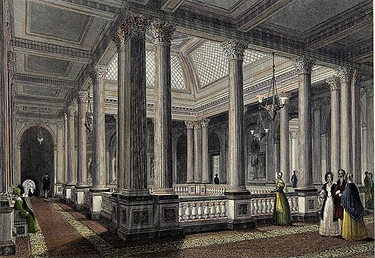
1841 Lithograph of the interior of London's Reform Club. Here Phileas Fogg enters into the wager that begins his attempt to circumnavigate the globe. The Reform Club is a private members club on the south side of Pall Mall in central London. As with all London's original gentlemen’s clubs, it comprised an all-male membership for decades, but was the first to change its rules to include the admission of women on equal terms in 1981. Since its founding, the Reform Club has been the traditional home for those committed to progressive political ideas, with its membership initially consisting of Radicals and Whigs. However, today it is no longer associated with any particular political party, and now serves a purely social function.
In 1832, Parliament passed a law changing the British electoral system. It was known as the Great Reform Act.
This was a response to many years of people criticising the electoral system as unfair. For example, there were constituencies with only a handful of voters that elected two MPs to Parliament. In these rotten boroughs, with few voters and no secret ballot, it was easy for candidates to buy votes. Yet towns like Manchester that had grown during the previous 80 years had no MPs to represent them.
In 1831, the House of Commons passed a Reform Bill, but the House of Lords, dominated by Tories, defeated it. There followed riots and serious disturbances in London, Birmingham, Derby, Nottingham, Leicester, Yeovil, Sherborne, Exeter and Bristol.
The riots in Bristol were some of the worst seen in England in the 19th century. They began when Sir Charles Weatherall, who was opposed to the Reform Bill, came to open the Assize Court. Public buildings and houses were set on fire, there was more than £300,000 of damage and twelve people died. Of 102 people arrested and tried, 31 were sentenced to death. Lieutenant-Colonel Brereton, the commander of the army in Bristol, was court-martialed.
There was a fear in government that unless there was some reform there might be a revolution instead. They looked to the July 1830 revolution in France, which overthrew King Charles X and replaced him with the more moderate King Louis-Philippe who agreed to a constitutional monarchy.
In Britain, King William IV lost popularity for standing in the way of reform. Eventually he agreed to create new Whig peers, and when the House of Lords heard this, they agreed to pass the Reform Act. Rotten boroughs were removed and the new towns given the right to elect MPs, although constituencies were still of uneven size. However, only men who owned property worth at least £10 could vote, which cut out most of the working classes, and only men who could afford to pay to stand for election could be MPs. This reform did not go far enough to silence all protest. -- UK National Archives
Around the World in 80 Days (French: Le tour du monde en quatre-vingts jours) is a classic adventure novel by the French writer Jules Verne, first published in 1873. In the story, Phileas Fogg of London and his newly employed French valet Passepartout attempt to circumnavigate the world in 80 days on a £20,000 wager set by his friends at the Reform Club. (read more)
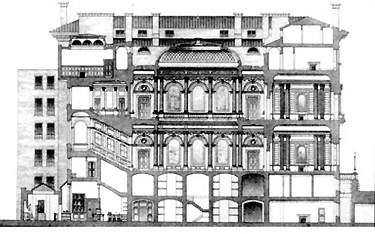
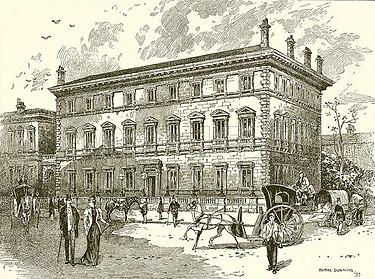
The Reform Club was founded in 1836, in Pall Mall, in the centre of what is often called London's Clubland. The founders commissioned a leading architect of the day, Charles Barry, to build an imposing and palatial clubhouse. It is as splendid today as when it opened in 1841. Membership was restricted to those who pledged support for the Great Reform Act of 1832, and the many MPs and Whig peers among the early members developed the Club as the political headquarters of the Liberal Party.
Around the World in 80 Days
By Jules Verne, Chapter I
In which Phileas Fogg and Passepartout Accept Each Other, the One as Master, the Other as Man
Mr. Phileas Fogg lived, in 1872, at No. 7, Saville Row, Burlington Gardens, the house in which Sheridan died in 1814. He was one of the most noticeable members of the Reform Club, though he seemed always to avoid attracting attention; an enigmatical personage, about whom little was known, except that he was a polished man of the world. People said that he resembled Byron — at least that his head was Byronic; but he was a bearded, tranquil Byron, who might live on a thousand years without growing old.
Certainly an Englishman, it was more doubtful whether Phileas Fogg was a Londoner. He was never seen on ‘Change, nor at the Bank, nor in the counting-rooms of the “City”; no ships ever came into London docks of which he was the owner; he had no public employment; he had never been entered at any of the Inns of Court, either at the Temple, or Lincoln’s Inn, or Gray’s Inn; nor had his voice ever resounded in the Court of Chancery, or in the Exchequer, or the Queen’s Bench, or the Ecclesiastical Courts. He certainly was not a manufacturer; nor was he a merchant or a gentleman farmer. His name was strange to the scientific and learned societies, and he never was known to take part in the sage deliberations of the Royal Institution or the London Institution, the Artisan’s Association, or the Institution of Arts and Sciences. He belonged, in fact, to none of the numerous societies which swarm in the English capital, from the Harmonic to that of the Entomologists, founded mainly for the purpose of abolishing pernicious insects.
Phileas Fogg was a member of the Reform, and that was all.
The way in which he got admission to this exclusive club was simple enough.
He was recommended by the Barings, with whom he had an open credit. His cheques were regularly paid at sight from his account current, which was always flush.
Was Phileas Fogg rich? Undoubtedly. But those who knew him best could not imagine how he had made his fortune, and Mr. Fogg was the last person to whom to apply for the information. He was not lavish, nor, on the contrary, avaricious; for, whenever he knew that money was needed for a noble, useful, or benevolent purpose, he supplied it quietly and sometimes anonymously. He was, in short, the least communicative of men. He talked very little, and seemed all the more mysterious for his taciturn manner. His daily habits were quite open to observation; but whatever he did was so exactly the same thing that he had always done before, that the wits of the curious were fairly puzzled.
Had he travelled? It was likely, for no one seemed to know the world more familiarly; there was no spot so secluded that he did not appear to have an intimate acquaintance with it. He often corrected, with a few clear words, the thousand conjectures advanced by members of the club as to lost and unheard-of travellers, pointing out the true probabilities, and seeming as if gifted with a sort of second sight, so often did events justify his predictions. He must have travelled everywhere, at least in the spirit.
It was at least certain that Phileas Fogg had not absented himself from London for many years. Those who were honoured by a better acquaintance with him than the rest, declared that nobody could pretend to have ever seen him anywhere else. His sole pastimes were reading the papers and playing whist. He often won at this game, which, as a silent one, harmonised with his nature; but his winnings never went into his purse, being reserved as a fund for his charities. Mr. Fogg played, not to win, but for the sake of playing. The game was in his eyes a contest, a struggle with a difficulty, yet a motionless, unwearying struggle, congenial to his tastes.
Phileas Fogg was not known to have either wife or children, which may happen to the most honest people; either relatives or near friends, which is certainly more unusual. He lived alone in his house in Saville Row, whither none penetrated. A single domestic sufficed to serve him. He breakfasted and dined at the club, at hours mathematically fixed, in the same room, at the same table, never taking his meals with other members, much less bringing a guest with him; and went home at exactly midnight, only to retire at once to bed. He never used the cosy chambers which the Reform provides for its favoured members. He passed ten hours out of the twenty-four in Saville Row, either in sleeping or making his toilet. When he chose to take a walk it was with a regular step in the entrance hall with its mosaic flooring, or in the circular gallery with its dome supported by twenty red porphyry Ionic columns, and illumined by blue painted windows. When he breakfasted or dined all the resources of the club — its kitchens and pantries, its buttery and dairy — aided to crowd his table with their most succulent stores; he was served by the gravest waiters, in dress coats, and shoes with swan-skin soles, who proffered the viands in special porcelain, and on the finest linen; club decanters, of a lost mould, contained his sherry, his port, and his cinnamon-spiced claret; while his beverages were refreshingly cooled with ice, brought at great cost from the American lakes.
If to live in this style is to be eccentric, it must be confessed that there is something good in eccentricity.
The mansion in Saville Row, though not sumptuous, was exceedingly comfortable. The habits of its occupant were such as to demand but little from the sole domestic, but Phileas Fogg required him to be almost superhumanly prompt and regular. On this very 2nd of October he had dismissed James Forster, because that luckless youth had brought him shaving-water at eighty-four degrees Fahrenheit instead of eighty-six; and he was awaiting his successor, who was due at the house between eleven and half-past.
Phileas Fogg was seated squarely in his armchair, his feet close together like those of a grenadier on parade, his hands resting on his knees, his body straight, his head erect; he was steadily watching a complicated clock which indicated the hours, the minutes, the seconds, the days, the months, and the years. At exactly half-past eleven Mr. Fogg would, according to his daily habit, quit Saville Row, and repair to the Reform.
A rap at this moment sounded on the door of the cosy apartment where Phileas Fogg was seated, and James Forster, the dismissed servant, appeared.
The new servant,” said he.
A young man of thirty advanced and bowed.
You are a Frenchman, I believe,” asked Phileas Fogg, “and your name is John?”
Jean, if monsieur pleases,” replied the newcomer, “Jean Passepartout, a surname which has clung to me because I have a natural aptness for going out of one business into another. I believe I’m honest, monsieur, but, to be outspoken, I’ve had several trades. I’ve been an itinerant singer, a circus-rider, when I used to vault like Leotard, and dance on a rope like Blondin. Then I got to be a professor of gymnastics, so as to make better use of my talents; and then I was a sergeant fireman at Paris, and assisted at many a big fire. But I quitted France five years ago, and, wishing to taste the sweets of domestic life, took service as a valet here in England. Finding myself out of place, and hearing that Monsieur Phileas Fogg was the most exact and settled gentleman in the United Kingdom, I have come to monsieur in the hope of living with him a tranquil life, and forgetting even the name of Passepartout.”
Passepartout suits me,” responded Mr. Fogg. “You are well recommended to me; I hear a good report of you. You know my conditions?”
Yes, monsieur.”
Good! What time is it?”
Twenty-two minutes after eleven,” returned Passepartout, drawing an enormous silver watch from the depths of his pocket.
You are too slow,” said Mr. Fogg.
Pardon me, monsieur, it is impossible —”
You are four minutes too slow. No matter; it’s enough to mention the error. Now from this moment, twenty-nine minutes after eleven, a.m., this Wednesday, 2nd October, you are in my service.”
Phileas Fogg got up, took his hat in his left hand, put it on his head with an automatic motion, and went off without a word.
Passepartout heard the street door shut once; it was his new master going out. He heard it shut again; it was his predecessor, James Forster, departing in his turn. Passepartout remained alone in the house in Saville Row.
(to be continued)
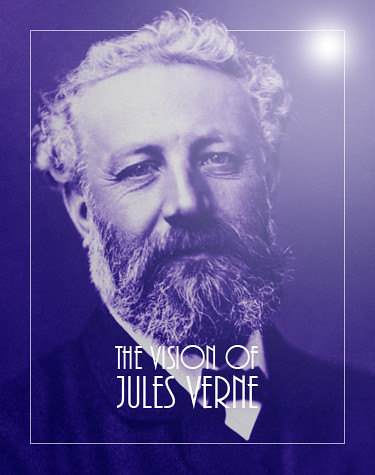
The Vision of Jules Verne
[click to read]
He was born in 1928 in the port city of Nantes, France. His father was a pragmatic lawyer but his mother nurtured his creative inclinations. Though he followed his father’s wishes and trained to be a lawyer, he would go on to meet publisher Pierre-Jules Hetzel who would serialize his stories. These Voyages Extraordinaires would eventually become his famous novels earning him the title: “Father of Science Fiction.” Although Verne died in 1905 his works continued to be published and he would become the second most translated author in the world. Verne saw the technological revolution of the Nineteenth Century as it unfolded and crafted new applications of it as he charted his ‘Voyages.’ It is not surprising that as a youth I was drawn to his work.
This Biography Presentation [click to watch] of his life gives even more insight into the life of Jules Verne. I have to give him much credit for inspiring PONTIFUS and my upcoming APOLLONIUS, which debuts here as a serial feature in the weeks to come.
